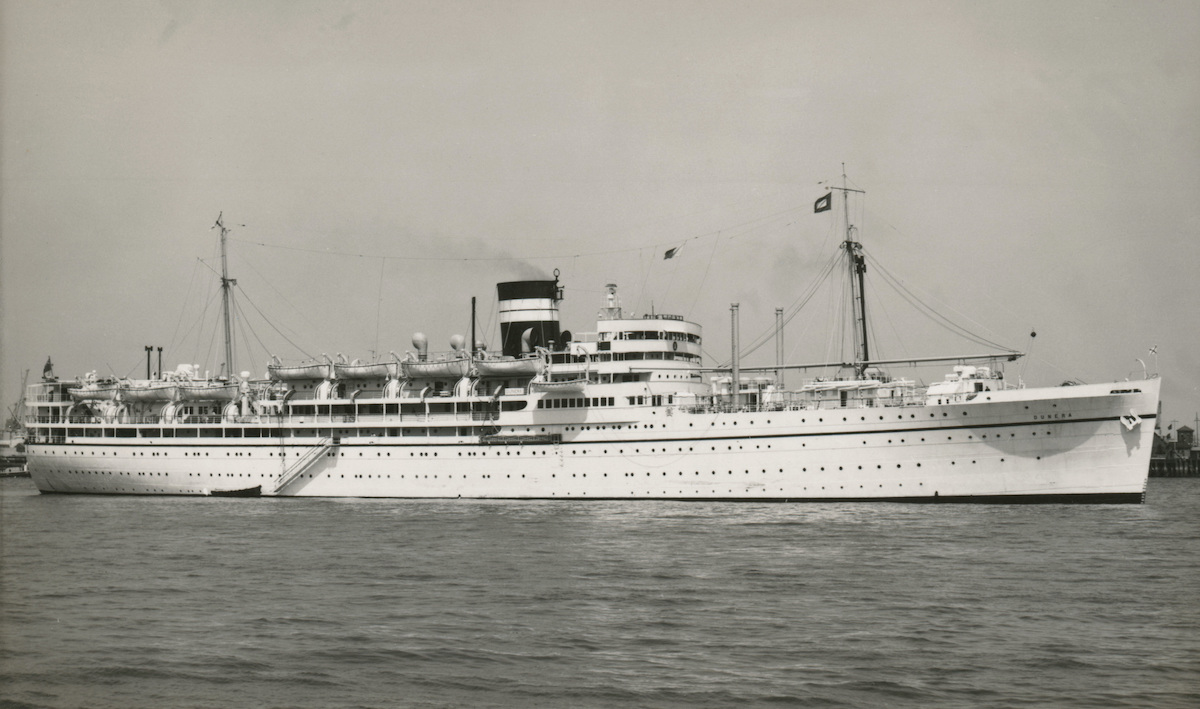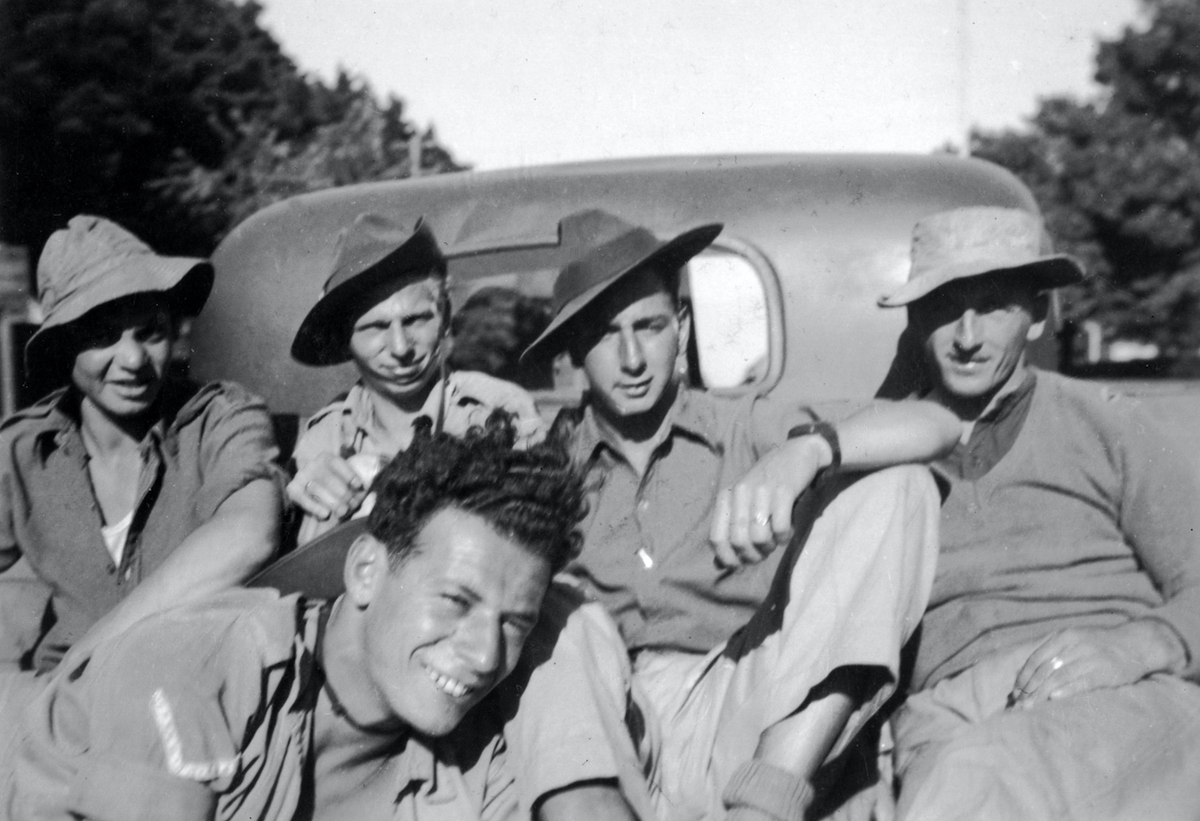In 1943, a group of refugee aliens – most of them ‘Dunera Boys’ – created and performed a revue titled Sergeant Snow White at the Union Repertory Theatre at the University of Melbourne.
This year, on its 81st anniversary, the University of Sydney’s Ian Maxwell, chair of Theatre and Performance Studies, has recreated the show with its original script and a cast of student actors for showings in Belvoir’s Downstairs Theatre.
“This project investigates, in and through performance practice, this extraordinary work, the circumstances in which it was created, and its complex – and overlooked– legacy,” says Maxwell.
Who were the ‘Dunera Boys’?

The passenger ship Dunera. Photo courtesy of the Australian National Maritime Museum Collection, ANMS0413[060]
The ‘Dunera Boys’ included many artists, musicians, and writers. “They were the kinds of people who had fled Hitler’s regime in the years leading up to the war,” Maxwell says.
Almost immediately upon arrival in Hay, the men formed a ‘university’: art classes, reading groups, orchestras and theatre groups, a cultural project that continued when many were relocated in May 1941 to a less climatically severe camps in Tatura, Victoria.
Dunera Boys and theatre

‘Dunera Boys’ in Tatura. Photo courtesy of the Brent Family.
While interned, the young men rehearsed and presented several plays, such as R. C. Sherriff’s 1928 World War I drama Journey’s End, and several revues, including a Christmas show titled Sergeant Snow White. Directed by Kurt ‘Doc’ Sternberg in Hay in December 1940, it was later reworked in Tatura as Snow White Joins Up for the 1941-42 New Year Revue.
Later in 1942, several hundred men were released from internment in order to contribute to the Army Labour Corps, and initially put to work picking fruit in the Goulburn Valley.
By April, the 8th Employment Company was raised, consisting of men from the Dunera and the Queen Mary. It was stationed at Caulfield racecourse and later at Camp Pell, an American military base in Royal Park, Parkville, adjacent to the University of Melbourne.
On 17 April, 1943, the men of the 8th, under the direction of ‘Doc’ Sternberg, presented the revue Sergeant Snow White in the Union Theatre in Carlton. The show ran over three evenings, to full houses, and enthusiastic reviews, and was reprised in May for three further performances.
Sergeant Snow White
Maxwell has been studying the original script for Sergeant Snow White, a musical play created by the Dunera Boys over several years. “It consists of three acts, and, as the title suggests, is a spin on Disney’s 1937 Snow White and the Seven Dwarfs,” he says.
The first act is set in the court of Queen Columbia, who is jealous of Snow White, and preparing for a grand banquet. Meanwhile, deep in the forest, an evil witch has conjured up a wolf, tasking him with disrupting the banquet, and securing the Queen’s alliance for his evil Axis. “At the banquet, all hell breaks loose as the Wolf seizes the court, including all the ‘good fairies’, and casts them into imprisonment,” Maxwell explains.
The second act, Sounds of Europe, involves a radio tuning into the cities of a Europe devastated by war. In a series of sketches, musical pieces, dances, and dramatic scenes, it presents, says Maxwell, “a Goya-esque – with shades of Dada – vision of a civilisation in tatters.”
The final act sees the men of the 8th – now the Seven Dwarfs – hard at work on the wharves of Melbourne, culminating in a riotous party to celebrate the first anniversary of the formation of the Company. The show culminates with a song Calling all Cobbers, in which the men celebrate Australia, and the opportunity they have been afforded for the future.
The progressive playwright, critic and broadcaster Catherine Duncan reviewed Sergeant Snow White for Listener in May 1943. She observed that:
“The chief significance of the show lies, indeed, in that future time when Sergeant Snow White make his permanent home in Australia. Under the uniform disguise of khaki, the 8th Employment Company includes many talented artists from overseas in its ranks.”
“Doctor Sternberg, the writer and producer, was once a film director for Gaumont British, and adapted many interesting film devices to the stage in this production. Peter Schmitz, choreographer and solo dancer, was formerly a member of the Russian ballet in London. There is the municipal organist from Singapore, and leading jazz band players from Europe and Malaya. Eric Liffmann – Snow White’s Prince Charming – has a magnificent tenor voice known already to Melbourne radio audiences as well as to listeners in Holland and England.”
“Here is the nucleus of a cast that can put on something new in entertainment – something which can make a real contribution to the Australian theatre. If we can welcome these young artists in the ‘good new times’ as warmly as we applauded them in uniform, Sergeant Snow White is not merely a soldiers’ show. It is a pointer to the future. It may be the forerunner to other shows which are more truly expressive of our own Australian personality.”
Bringing the script to life
The script from the original presentation is held in the Jewish Museum of Australia in Melbourne. It has barely been seen since 1943; a single scholarly article by an eminent German scholar the only sustained attention it has been given.
Now, exactly 81 years to the day since its first performance in 1943, the graduating acting students of the JMC Academy are presenting Sergeant Snow White in the Downstairs Theatre at Belvoir St, directed by Maxwell, with musical direction by Joseph Toltz.
“The production uses the original script and adds three new texts to extend the reflections on exile, war, and the experiences not only of men like the Dunera Boys, but women,” says Maxwell.
“Taking up the evident delight in the script at opportunities to cross-dress – and indeed, the overall libidinal atmospherics of the work – our production takes liberties with gender and casting.”
“The performance is riotous, swinging from absurdist pantomime to earnest drama, from proto-Pythonesque absurdity to slapstick,” he says. “It includes a spread of musical genres from romantic song to swing quartets to country blues to rapping and Brechtian choruses.”
“Most importantly, the work takes us deep into the experience of displaced young men, transported, brutalised and interned, and who immediately set about making culture: song, theatre, art, music.”
The revival takes audiences back to to 1943, says Maxwell, to a moment when the outcome of the war was still in doubt. It also captures something of the optimism and joy with which these men responded to the warmth they encountered from the moment of their disembarkation in Ultimo.
“More, this work brings to light a forgotten moment of Australian theatre history: possibilities and expertise grounded in European traditions that have, perhaps, in our collective enthusiasm for a uniquely Australian theatre, overlooked.”
Sergeant Snow White is performed at Belvoir Downstairs on Saturday 20 April.











Comments
Log in to join the conversation.